You feel pushed. Manipulated. Exploited. Dominated. Coerced. Pressured. Bullied. Controlled.
The person in front of you has gone too far and has overstepped your personal boundaries. But you don’t know what to do; you feel weak and helpless. A quiet desperation rises inside of you. You feel like a fly stuck in a web.
What can be done?

Soul Work Compass Course:
Feeling lost, stuck, and trapped in repetitive cycles of pain? Discover your Soul's Compass to reclaim your purpose and find your path to freedom.
⭐️⭐️⭐️⭐️⭐️ "I am finding out so much about myself and having so many realisations about my life ... I already know it is what I’ve needed for so long." – Jen N.
If you struggle with energy loss and issues such as over-commitment, lack of assertiveness, and feeling exhausted all the time by those around you, keep reading. It’s time to draw a clear line and reclaim your personal power.
Table of contents
- What are Personal Boundaries?
- Why Are Personal Boundaries So Important?
- Sensitivity, Absorbing Energy, and the Power of Purification Rituals
- 18 Signs You Have Poor Personal Boundaries
- 9 Signs Someone is Violating Your Boundaries
- Why Do We Suffer From Poor Personal Boundaries?
- 5 Myths About Personal Boundaries That People Believe
- Boundaries and the Spiritual Awakening Journey – Why They’re Crucial
- 12 Benefits of Creating Strong Personal Boundaries
- 9 Ways to Create Personal Boundaries That People Don’t Ignore
- Final Words
What are Personal Boundaries?

Personal boundaries are the mental, emotional, and physical walls we create to protect ourselves from being used, manipulated, drained, or violated by others.
These limits help us to clearly distinguish who we are and what we need from other people and their needs.
Creating and maintaining personal boundaries is essential to cultivating physical, emotional, and psychological well-being.
Why Are Personal Boundaries So Important?

Boundaries are an essential way of creating and upholding a healthy self-image. When a person has strong personal boundaries, it communicates to the world that they exude healthy self-respect and self-worth.
Most importantly, healthy boundaries help us to create a safe container within ourselves where self-compassion and mindfulness can blossom. Hence, creating boundaries makes us feel fundamentally good and preserves our personal integrity.
But without personal boundaries, we run the risk of confusing our needs and wants with others, which leads to codependency.
Want to get LonerWolf at the top of your Google search results?
Codependency is a term that describes a toxic one-sided relationship where we derive all of our happiness from others. The reality is that it’s impossible to enjoy a healthy relationship without strong and clear boundaries.
Without personal boundaries, there is also the risk of experiencing heightened stress and feelings of hopelessness.
Overcommitting to everyone and everything tends to take a serious toll on your mental health, which can eventually lead to burnout – or worse, a nervous breakdown.
Finally, a lack of personal boundaries can result in feelings of being worthless, weak, or not good enough. In other words, our self-esteem becomes severely impacted, and we may struggle with issues such as chronic self-doubt, self-judgment, and self-loathing.
Not being able to voice our truth and communicate our needs in a clear way can be deeply distressing and demoralizing.
Sensitivity, Absorbing Energy, and the Power of Purification Rituals

Developing clearly defined boundaries is crucial in all dimensions of life, including on the spiritual and energetic levels.
If you’re an empath or highly sensitive person like me (or someone who deals with people’s issues directly, like a healer or therapist), it’s always a wise idea to ground and clear your energy field each day as a form of boundary-setting.
We walk through life picking up so much mental, emotional, and energetic debris from the interactions we have with our environments.
Setting the ritual of purifying yourself on all levels can help you find more spiritual clarity, calmness, and groundedness, especially if you’re gifted with high sensitivity.
Some purification ritual ideas include:
Would you like to save this?
Your information will never be shared.
- Taking a shower or bath and visualizing all the gunk of the day washing down the drain
- Walking barefoot on the earth and feeling the ground’s energy neutralizing your energy field
- Sitting in nature and engaging in some ecotherapy
- Deep and slow breathing from the bottom of your belly (via breathwork)
- Using incense or herbal smoke
- Self-applied reiki (I do this daily, as well as the first recommendation)
18 Signs You Have Poor Personal Boundaries

Pay attention to the following signs. How many can you relate to?
- You fail to speak up when you’re treated badly
- You give away too much of your time
- You agree with a person when you actually feel like disagreeing
- You say “yes” to a person when you want to say “no”
- You feel guilty for dedicating time to yourself
- You feel taken for granted by others
- You permit people to touch you when you feel uncomfortable or want them to stop
- You have toxic relationships (i.e., you’re always giving, and the other is always taking)
- You make too many grand sacrifices for others at your own expense
- You are passive-aggressive and might have manipulative tendencies (as a way of trying to regain your lost power)
- You constantly feel like the victim
- You feel like you have to “earn” respect by being nice
- You over-share details about your life with others
- You feel guilty when others aren’t happy (as if you’re solely responsible)
- You are what other people want/need you to be, and not who YOU need to be
- You’re out of touch with your needs
- You attract people who try to control or dominate you
- You have chronic fear about what others think of you
Pause to consider which one of these points caught your eye and tugged at your awareness most strongly. Then, take a moment to place a hand over your heart and send yourself some understanding and kindness.
Having poor boundaries is a frustrating and painful experience, and you’re certainly not alone in experiencing it.
9 Signs Someone is Violating Your Boundaries
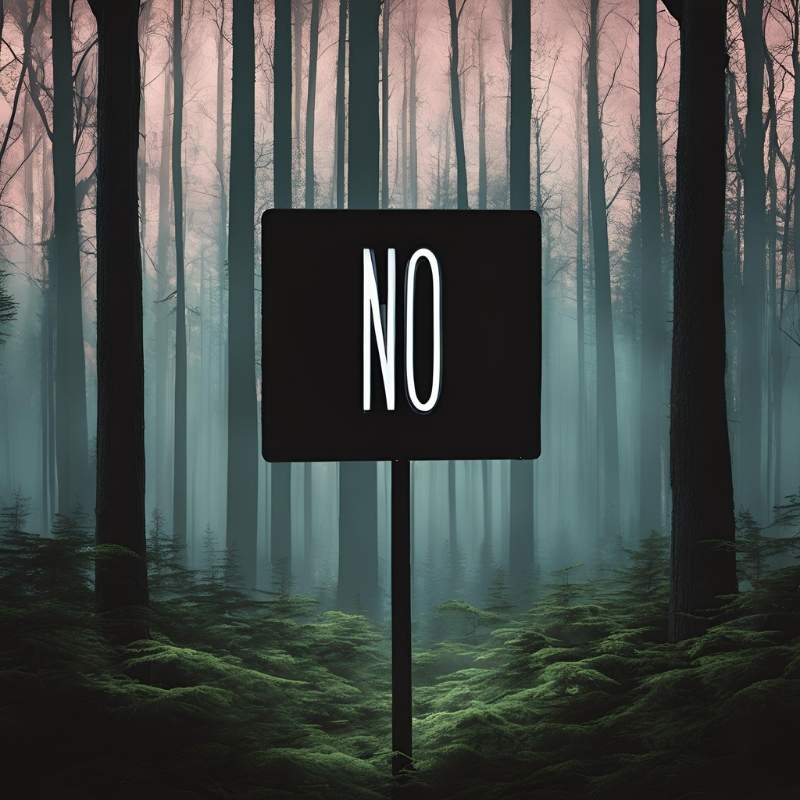
Pay attention to these red flags of having your personal boundaries violated:
- You feel the need to defend your boundaries (because the other person is resistant to you setting them for some reason).
- Your “no” isn’t being respected, and the person keeps doing the behavior that causes you to feel threatened or uncomfortable.
- Your personal space is being violated, and the person is touching you or standing too close to you in a way that makes you feel gross or unnerved.
- You aren’t being listened to, and you keep getting spoken over or ignored.
- You’re experiencing emotional abuse, and the other person mocks, denigrates, or manipulates you.
- You’re being pressured to act in a certain way or do something that you don’t want to do.
- You’re being controlled and coerced to play a certain role.
- You feel as though you can’t negotiate with the person because it’s ‘their way or the highway.’
- You feel disturbed, exhausted, or on-edge after being around the person for reasons you can’t quite pinpoint.
You’ll find that sometimes, some people unintentionally violate your boundaries (e.g., showing up unannounced at your house as a ‘surprise visit’).
Other times – like what I’ve experienced a lot due to life circumstances – you’ll deal with people who have a dark triad personality (narcissistic, machiavellian, or psychopathic personalities) who seem to get pleasure out of overstepping your boundaries as a way of ‘testing’ you.
Remember that you are a sovereign being, and your boundaries are sacred. They’re your protective bubble to keep, maintain, and assert at will.
Why Do We Suffer From Poor Personal Boundaries?

Before going too deeply into the understandable urge to blame or shame yourself in some way for having poor boundaries, I want you to understand that it wasn’t your fault, but it is your responsibility to develop strong boundaries now. So take a moment to feel some compassion, or at least sympathy, for yourself.
As children, we had no control over what our parents, teachers, and the adults around us taught us.
As a result, most people with absent or weak personal boundaries as adults struggle to feel confident enough to draw a line and adequately tend to their needs.
The codependent dynamics within our families, as well as being taught that “love equals what we do, not who we are,” contribute significantly to this lack of internal solidity.
As children, the first role models we had of “acceptable” behavior were our parents and family members. So pause to reflect here: what messages did your mother, father, caretakers, siblings, or other adults send to you growing up?
Were you only given love when you pretended to be who your parents or caretakers wanted you to be?
Were you only rewarded when you went out of the way to sacrifice your needs and desires in favor of someone else’s?
Were you punished for saying “no” or speaking up?
For over 12 years, we've poured our hearts into creating free content on this website. Unlike many platforms, we believe this guidance should be accessible to everyone. If this post empowered you in any way, please consider making a donation to keep us going. Any amount (one-time or ongoing) makes a huge difference.
Did you feel obliged to emotionally “take care” of an adult, perhaps a parent?
These were all signs that you were taught that it was “good” to lack personal boundaries.
5 Myths About Personal Boundaries That People Believe

If you struggle with setting clear boundaries, you might carry a number of mistaken beliefs that you were conditioned to believe.
Here are some myths to be aware of:
- “Having personal boundaries is selfish.” – This myth is probably the most common one out there and it’s based on the unhealthy belief that in order to be worthy, we must be martyrs constantly self-sacrificing our needs. In reality, having boundaries is a form of self-respect that allows us to practice self-love, which can ripple out into the world and positively influence those around us. Take a moment to reflect on any good therapist or mental health professional. How do they do their job effectively? The answer is by having strong and clear personal boundaries. (Imagine taking on all the issues of those you serve – how exhausting and overwhelming!) The truth is that all mentally and emotionally healthy people possess clear boundaries.
- “Having personal boundaries will cause my relationships to suffer.” – If you are in a codependent relationship, creating boundaries will most certainly create uncomfortable waves of change. If your partner is codependently entangled with you, there’s a high chance that they will be shocked and will certainly resist your efforts to be happy and healthy. (The same thing goes for codependent friendships.) If you find yourself in this situation, I encourage you to consider whether being in a toxic relationship/friendship is actually worth it. All healthy and supportive relationships will actually THRIVE and encourage the establishment of personal boundaries.
- “Having personal boundaries will cause people to dislike me.” – This myth is partly true and partly false. The reality is that, yes, setting clear boundaries might step on a few people’s toes. But creating boundaries will also cause more people to respect, hear, and like you. There’s nothing more admirable than a person who refuses to take bullshit from others and who stands by what they believe to be true. Not only that, but when you set boundaries, you’ll actually attract more people who are willing to respect you and be authentic friends or lovers.
- “Having personal boundaries will make me miserable.” – This myth often appears as an underlying assumption that many people carry. But my response is simple: creating personal boundaries might feel uncomfortable at first, but pretty soon, it’ll make you feel empowered and in control of your life again. So the opposite here is true: having personal boundaries will actually make you MUCH happier!
- “Having personal boundaries sounds rigid.” – Personal boundaries are not black or white or set in stone – they are flexible according to your needs in the moment. So don’t feel the need to be harsh and cut people off. There’s a big difference between rigid boundaries and healthy boundaries. Rigid boundaries are walls constructed to permanently block people out, whereas healthy boundaries are adaptable and can change according to our inner needs.
Boundaries and the Spiritual Awakening Journey – Why They’re Crucial

Creating healthy personal boundaries doesn’t just benefit our everyday interactions with others, but it also enriches and strengthens our connection with our Souls.
When we’re constantly looking outside of ourselves and people-pleasing, we tend to forget that we all have a unique path in life, and it’s our job to listen to our true callings.
Lacking boundaries means that we’re frequently looking to others for direction and getting codependently enmeshed in their lives rather than focusing on our own.
Sometimes, what happens is that we get so wound up in other people that we “lose” ourselves. We experience a kind of soul loss (or being disconnected from our souls) that creates feelings of emptiness, loneliness, aimlessness, anxiety, and depression.
Lacking self-awareness of our true needs because we have poor boundaries, we may even fall into a Dark Night of the Soul where we feel totally lost and disconnected from our Higher Power (whatever that personally looks like).
Creating boundaries is an essential part of the spiritual awakening journey because it supports us in being true to ourselves, embracing our inner lone wolf, and walking our own paths.
12 Benefits of Creating Strong Personal Boundaries

Here are some benefits that you can expect from putting in the hard work of setting clear boundaries:
- You’ll be able to say “no”
- You’ll feel empowered again
- You’ll feel more in control of your life
- You’ll attract healthy + supportive partners and friends
- You’ll have more mental, emotional, and physical energy
- You’ll be able to speak up and be heard
- You’ll feel more appreciated and valued
- You’ll be more in touch with your needs
- You’ll spend more time on yourself (without the guilt)
- You’ll experience more emotional balance and happiness
- You’ll experience increased self-esteem and self-worth
- You’ll feel more courage and freedom to be yourself
Remember that these qualities won’t develop overnight, but with practice and persistence, you’ll be able to experience many of these empowering benefits.
9 Ways to Create Personal Boundaries That People Don’t Ignore
Creating boundaries is less about other people and more about you and the beliefs and mindsets you have.
The following practices and pieces of advice will help you target both your core beliefs and habitual behaviors.
1. Understand that you have the right to have boundaries

Lurking underneath the surface of people-pleasing behavior is the belief that we “have no right” to set boundaries. It’s time to challenge this ingrained assumption.
Why are others allowed to have boundaries and not you? Why must you feel like a lesser human being and elevate others above yourself?
It is a fundamental right of all human beings to have personal boundaries. Consider it your birthright to establish boundaries that define and protect you. Not only is it your right to create boundaries, but it is also your responsibility.
2. Understand that your thoughts, feelings, and needs are equally important to others

No one’s thoughts, feelings, or needs are “above” anyone else’s. Social status is an illusion created by the human mind.
In other words, the Queen of England’s needs are equal to a homeless person’s needs. The only division created between us and others exists in the mind. Therefore, you are not “less important,” valuable, or worthy than others. Your needs are equally important to those in your life.
Learn to see yourself as equal to others. Affirm your worth each and every day with a mantra such as “I am worthy and my needs are important.” Learn to disagree with those who try to make you think or feel otherwise.
3. Explore your needs
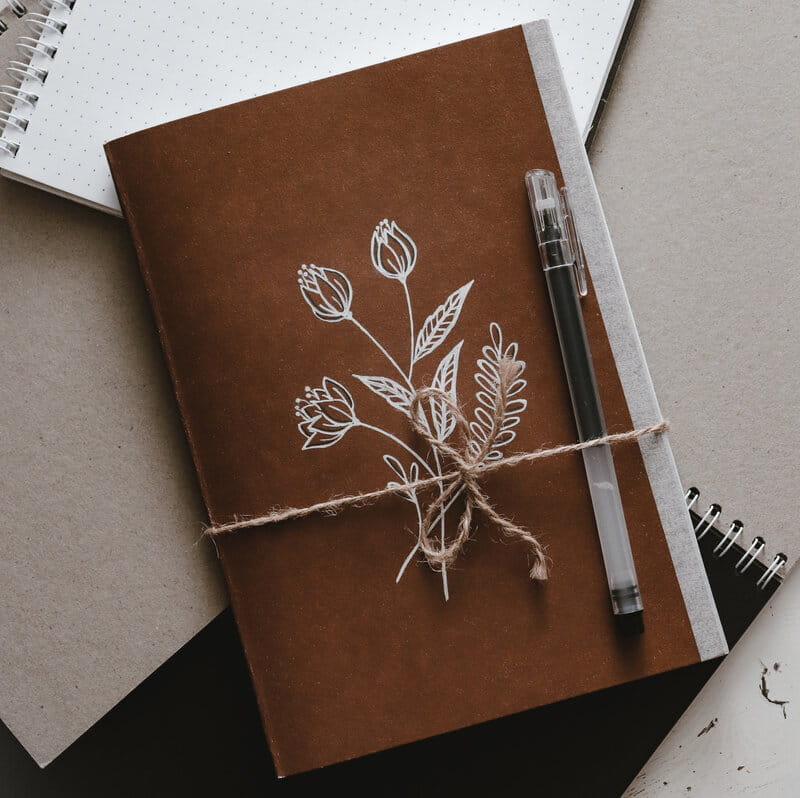
Chances are that you don’t have much experience or knowledge of your true needs, especially if you ignore them to cater to others’ demands. Now is the time to start learning more about yourself.
Keep a daily journal in which you record your thoughts, feelings, needs, and desires. Practicing self-reflection and introspection will help you to become more in tune with what you really need at any given moment. (Here are some journaling ideas.)
Practicing a few simple mindfulness exercises is another powerful way to know what boundaries you need to set during the day.
Dedicate yourself to tuning into and learning more about who you are and what you really want out of life. This is one of the best ways to begin setting personal boundaries.
A fun way to start learning about who you are is by taking self-discovery tests (take a look at our many insightful tests!).
4. Practice daily self-care (because you’re worth it!)

Practicing daily self-care is a supplementary practice that will bolster your ability to set clear personal boundaries.
When you get into the habit of nurturing yourself, you’re already setting yourself up for success. You’re sending yourself the message that “I’m worth taking care of.” Setting firm boundaries will then seem like the next natural step in your self-care routine.
Simple ways to perform self-care include taking time to relax, practicing meditation, making delicious and nutritious food for yourself, exercising, setting daily goals, complimenting yourself, rewarding yourself, taking a nap, connecting with nature, drinking a soothing cup of tea, and many other practices.
Check out this article on self-love for more suggestions.
5. Learn to say “no”
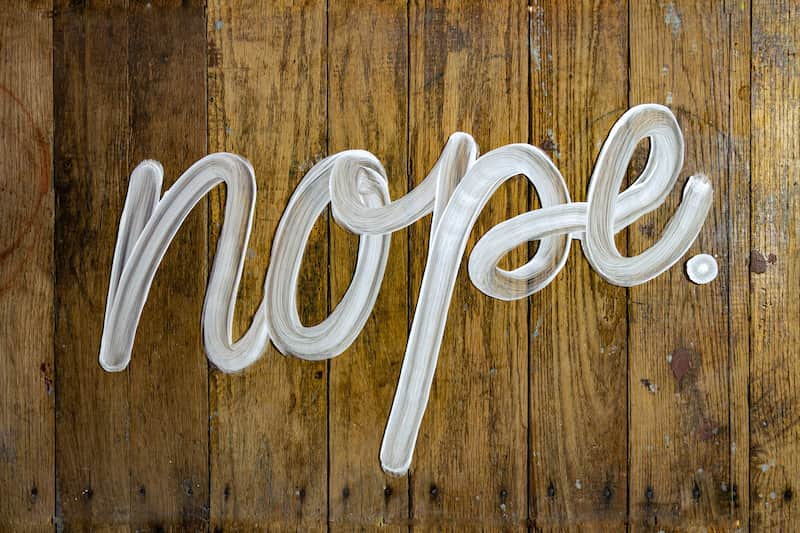
Saying no is a key part of learning to be assertive and honoring your needs. You don’t need to flat out or aggressively say “no” if the situation doesn’t call for it.
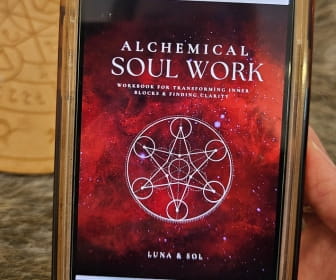
Struggling with inner blockages?
Learn how to transform your confusion into clarity. With 50+ deep dive prompts, your journey of self-discovery awaits in our Alchemical Soul Work Workbook.
Instead, you can try saying phrases such as “No thank you,” “I can’t,” “I’m not able to,” “Not now,” “I’m busy, sorry,” “Maybe next time,” “I appreciate the offer, but I’m unable to,” and so forth.
Experiment with different ways of saying no and see what feels most resonant with your personality.
6. Identify when people cross the line (aka., “difficult people”)

It’s not always easy to identify when others overstep your boundaries, particularly if you’re used to not having any. However, there are some types of people (let’s call them “difficult people”) who quite blatantly cross the line.
Take time to record in a private journal each day all of the moments when you felt uncomfortable, upset, or disrespected by someone during the day. This journaling exercise will help you to develop more self-awareness.
Another way to know when people have overstepped your boundaries is by tuning into your body. Try to notice when you feel sensations like butterflies in your stomach, tension in your shoulders, or an increase in blood pressure, which will manifest as feeling flustered and hot.
Use these sensations as triggers to help you tune into the present moment and practice boundary setting.
To set boundaries with difficult people such as narcissistic, histrionic, and other egomaniac types:
- Create a list (on your phone, in your journal, etc.) of ways to say “no” that don’t stir up drama and preserve your energy (see the previous point on this list)
- Try to create as much physical, mental, and emotional distance from them as possible whenever you can
- Don’t get invested in their chaos – remember that they are responsible for themselves and their own well-being
- If you’re stuck dealing with such a person, try the “grey rock” method of self-protection where you become as bland and neutral as possible so as to stay grounded and calm
7. Stop overcommitting

You’re not obliged or indebted to uphold every single social commitment that you have. Don’t try to please others at your own expense. Committing too much to other people and circumstances creates stress and burnout.
Learning to say no to non-essential things like work get-togethers, parties, and other social duties that are not life-or-death takes practice.
So be gentle with yourself, remind yourself why you’re on this journey in the first place, and graciously decline whatever “fills your cup” too much. At the very least, others will appreciate your honesty.
8. Be courageous: let go of toxic friendships and relationships

It takes a certain level of courage to stick to your personal boundaries. Fake friends and flimsy relationships will inevitably self-destruct and fizzle away during this process. As a result, you might be left with feelings of guilt, shame, or feel like you’re doing something wrong.
It’s vital in these tough times to keep affirming that setting personal boundaries is your fundamental human right. You are WORTH it.
Those who try to control, use, or abuse you will likely try to stop you – but don’t let them hold you back. Step away from those people who are polluting your life and seek out new friendships that are supportive and uplifting.
9. Seek help (but not from friends or family)

If you still need help setting strong personal boundaries, chances are that those around you probably reinforce codependent behavior. So it’s not a wise idea to seek advice from them, however well-intentioned they may be.
If you need more in-depth advice and personal assistance, I recommend either reading a book such as Boundaries: When to Say Yes, How to Say No by Henry Cloud and John Townsend, or seeking the help of a therapist (or both).
I also recommend checking out the Sacred Boundaries Journal I’ve created to help you set clear, empowered personal boundaries.
If you’re a sensitive soul who doesn’t know how to say ‘no’ effectively, this journal can help you tune into your inner needs, access increased energy, and find more balance and self-sovereignty in life.
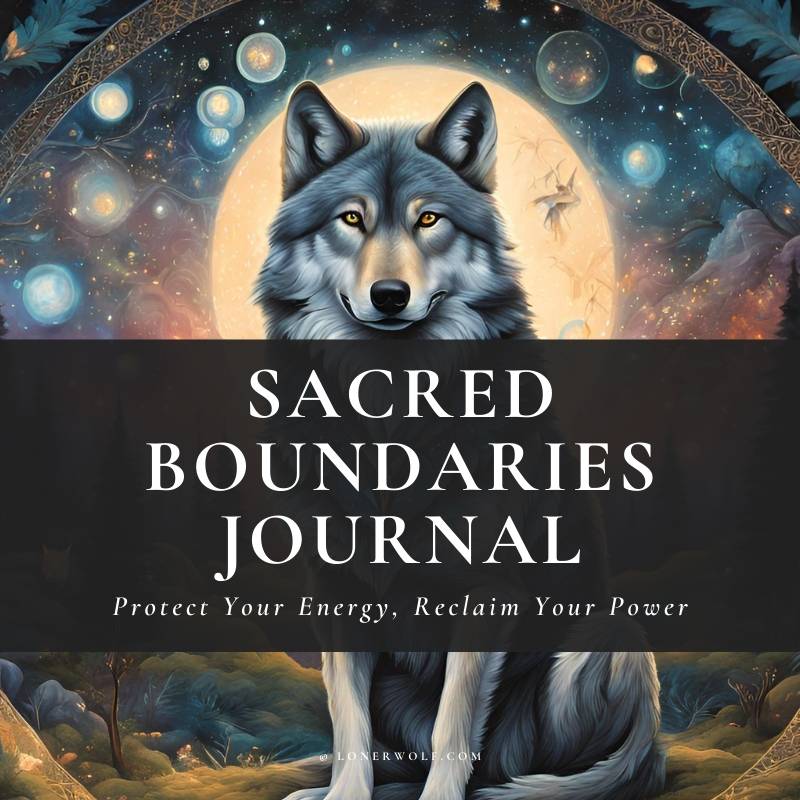
It features:
- 100% editable & printable format
- 30+ journaling prompts exploring the physical, mental, emotional, and spiritual dimensions of setting boundaries
- Lush images with quotes
- Healing mantras
- Oracle/tarot card spreads
- Book recommendations
You can download it as a bonus in our yearly LonerWolf Supporter Membership tier, where you get this journal plus a whole month of intuitive guidance and personal spiritual support.
This journal was a joy to create, and may it serve you well!
Final Words
To end, I want to remind you to be mindful of approaching this journey with gentleness and self-compassion.
You weren’t responsible for developing poor boundaries (it was how you were conditioned). However, you are responsible for now changing them and owning your personal power. I hope this article has given you some helpful pointers to help you do that.
Tell me, what experiences have you had with people overstepping your boundaries? And what advice can you give to others in your situation? I’d love to hear from you in the comments!
If you need more help, we offer 2 powerful ways to guide you on your inner journey:
1. The Soul Work Compass Course: Break free from feeling lost and disconnected. The Soul Work Compass is a practical 12-step course that transforms soul loss into soul clarity. Discover your core values, heal core wounds, and create a personalized compass to guide every decision you make.
2. The Inner Work Journal Bundle: Heal at the root. This Inner Work Journal Bundle guides you through self-love, inner child healing, and shadow integration with 150+ prompts and activities. You get editable digital files to use on any device or print unlimited times. Not for lukewarm seekers, these journals are for those ready to transform.
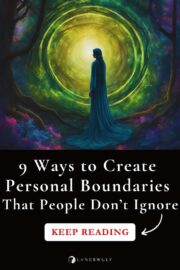
 $3
$3
This is really a good article about personal boundaries and helpful to those who struggle in that area. As for myself, I noticed I used to have almost all signs of poor personal boundaries, but I have made a good progress in the recent yers: I learned to say “no”, let go of a few toxic relationship and came more in touch with my needs. However, I still have a lot of work to do because I still tend to overcommit, always give and attract people who always take.
Thanks for your work.
This was a healing read..an affirmation to my personal desire to be free from any and all things. I have had a profoundly traumatic childhood and like Aletheia, I had to leave my entire family in order to heal myself. Neglect, abandonment and incest/sexual abuse has greater enormous challenges for me in just interacting with people. I have to spend an enormous amount of time isolated because my lack of ego development.
The article has touched on the core issues of boundaries. When you have been used for others gratification in whatever way, the victim suffers enormous lose even when language skill are lacking. My apparatus, my eco system spoke to me everyday about its severe emotional deprivation and it’s been my personal ambition to find who I am as a human and spiritual being. I have been ridicule for being “selfish” because my edifice, my outside appearance seems “put together” that it does not show signs of neglect in basic care. I have had to challenge not only my indoctrination’s regarding trauma or being wounded but I have had to teach others to respect how my apparatus communicates to me.
This article is dead on and I hope that many will find some form of understanding and respect for their sufferings. Sometimes are feelings have no real set word or words but when you read something and find that it speaks LOUDLY to you, it’s a blessing…a gift from the divine to help us along the path to peace.
I thank you for sharing your insights and wisdom into a much needed topic that plaques us all in one degree another. Boundaries are fundamental in any relationship that is center and anchored in mutual respect.
Blessings to you both….
I feel stuck because this is totally me! I have lack of personal boundaries! It feels to much and do not know how to fix it! Especially with my relations with my family. Tired of spending too much on things that I absolutely don’t want. Even though I like helping, but when it’s becomes like my job I can’t take it anymore. I feel angry all of a sudden and want to scream, whenever I get to do something I don’t do for others.
This article comes at the perfect time for me. I’m terrible with boundaries as I was very abused as a child. I just started working on boundaries today with my therapist. She’s just introducing me to the concept. Thank you so much. I love your emails and read every word of each linked article. I wish I could join your site other than through FaceBook which I don’t use. Oh well, I’m not going to be upset about that.
This is a great article, Sol! Thanks for providing such a good summary of what boundaries are and how to start creating them. My biggest challenge is my reactivity. In the moment when my boundaries are getting crossed, I’ll comply or shut down instead of speaking up. But once I’m away from the person and can think a bit, I come to terms with what happened and where I need to draw a line. How can I be more assertive in the moment, rather than after the fact?
Hey Tasha, thanks for sharing your experience with this.
I find that the easiest way to avoid being as reactive is by practicing beforehand.
By this I mean we must learn to develop a space between the moment we experience something and the moment we choose to act on it. The most common method for this is practicing any of the contemplative exercises, meditation being the most powerful and simplest.
By developing the muscle of awareness and learning to make space between ‘us’ and our emotions, we will be much less reactive when those moments arise.
Thank you so much for this article. It’s a perfect reminder that we all have the right to have boundaries ! In my case , I have started having difficulties in having my boundaries respected: ever since I’ve moved into a new country ,and into a new family ; I must admit that I was partly responsible right from the start for having given others ‘permission’ to cross my boundaries. Initially, I had little or no reactions to harsh comments from some family members , because I’m quite uncomfortable with new situations and new people , ( I’m an introvert); especially if those people would turn out to be toxic. Thanks to you, Luna and Sol, now I have learned that not having enough assertiveness in the presence of ‘energy vampires’ cannot help me much. I still have so much to learn from your great articles and books. I do feel empowered reading them! Thanks again for all your articles and the time and soul power you pour into your works. Lots of love and blessings to you
I’m happy to hear that Menila and you’re most welcome, thank you for sharing how much our work has supported you through your journey. It means a lot to the both of us!
I got surprised by a comment from my ex girl friend a few months ago, and didn’t know how to respond, and her new boyfriend also made a crack before we were spit up. He embarrassed me in front of my peers and left me speechless. I threw her out soon after, but felt so powerless during these interactions … Shit Tests!
I’m afraid I have been trained to be ashamed, as apposed to being strong, and I don’t like it. I don’t think any book is going to help in these instances, Throwing her out sooner might have though.
Thank you for writing this article! This is perfect timing for me to read right now, since I apparently have very weak boundaries and I feel like a doormat. Right now I have a manager who constantly crosses boundaries and tries to make everyone feel as small as possible and gets great joy from pissing people off . I’m an easy target because of weak boundaries. I will start journalling and following these tips to create some very necessary strong boundaries.
Thank you SO much!
You’re most welcome Susan :)
I received your email today and opened this article and it was exactly what I needed – thank you! I have only just realised I am an empath, after having had a breakdown, which I have realised is my Dark Night of the Soul. I am still struggling to come out of it and to protect myself from the daggers others are firing at me. I am trying to recover, but I cannot see the white light around me, the energy is blocked and I have been unable to protect myself from the negative energy of the people who are currently trying to dominate and control me. I have been very distressed by how much they despise me because I can see right through them and they don’t fool me as they fool everyone else. Thank you again for sending this today!
I have been in your shoes and I am coming out of it now, finally seeing the light again. Keep going, set boundaries, clear your chakras and believe in yourself. You are loved. Ask Archangel Michael to protect you and ask Archangel Raphael to Heal you, mind, body and spirit. This to shall pass.
My mother and father are both 83 years okd. Mom has always been controlling. Now that she is okder she needs help in many ways and go figure, I am the ine she needs to help her being the only daughter. I take her to all her appointments and help her with her bathing and personal needs. I am frustrated and burned out and need to get away but can’t. How do you tell a parent you are not going to be there for them anymore when they depend on you for help? They do not have the means for other assistance. I am near 60 years okd and have no life. I live in a minimal disability income and have no way to escape ☹️ I am locked into an apt with roommates until December and then I don’t know what I will do. I can’t move back home. That wil kill me.
You know, it seems that everything we do for others is a matter of “attitude” we gave at the time. If we “feel” that helping others (like our parent/s or someone in need) is a BLESSING instead of “thinking” it’s a burden, then our life feels enriched, peaceful and useful. It’s all a matter of “attitude”. Living with the concepts of “every one for themselves” is a dangerous risk of becoming Narcissistic. BALANCE is the key. “Thinking” you’re a victim of being used can change to “feeling” blessed to help another human being on this planet. Nelson Mandela, Desmond Tutu, Mother Theresa & other wise people understood this & actually “felt” blessed, not burdened. It’s all a matter of attitude.
Well said John. I saw a sign once (in an office) that said, Five Minute Attitude Adjustment. It went on to say if you were having a bad day, all it took was 5 minutes to re-adjust your attitude. You could either walk around miserable or start over with a smile.
John when your life is taxi service for everyone and Always being the one to help it tends to wear you out. I love helping others. I am a caregiver at heart. However, when you call someone and say I’m not feeling well and Please have someone else help you today and it goes unheard and unaccepted and you have to force yourself into that respinsibility for that day it is difficult. I am in disability for an inflammatory arthritis and degenerative arthritis, (two different devastaing conditions), I live in constant pain and still do all the time. It is not merely an attitude adjustment for me. It is difficult at best. I still maintain a smile and a correct attitude. I just need thise who depend on me to be understanding when I am not able. That doesn’t happen and I can’t let someone down when they need me no matter how difficult it is for me and that just not always right.
Pat I understand. It is easy for others to suggest you change your attitudes but relationships are a two way thing and you have as much right as the other ie in this case your mother to be appreciated, understood and cared about, whether those things are given to you by the other person or yourself, and it should be both! It sounds like you have an enormous amount to deal with, I am sorry, it sounds like you are not from the UK, carers can get some assistance here. Are there any charities that could help you with your mum? Both my parents are controlling too, and believe themselves always to be in the right. I am 56 but in their company feel like a 10 year old. I hope something or someone comes along to help you … i am posting this a year after yours, you may not see it, but sending you virtual hugs all the same x